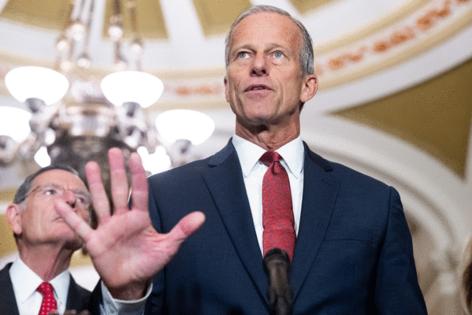Nomination rules, defense policy headline the week in Congress
Published in Political News
WASHINGTON — The annual defense policy bills dominate the House and Senate floor agenda this week, with Senate Republicans also looking to speed up the confirmation of President Donald Trump’s nominees.
The Senate’s goal is to finish up its version of the fiscal 2026 defense authorization bill by the end of the week. Senate Armed Services Chairman Roger Wicker, R-Miss., has filed a substitute amendment including a manager’s package of generally noncontroversial amendments bundled together to expedite the process. Senate leaders also appear to be attempting to roll authorizations for both the intelligence community and the State Department into the must-pass National Defense Authorization Act measure.
House Majority Leader Steve Scalise, R-La., has his chamber’s version of the NDAA on the schedule for the week, as well.
“As threats to our national security grow more complex, we must make certain our fighting force is ready to meet the challenge, and that means delivering the capabilities our warfighters need when they need them. This legislation does just that,” Scalise’s office said in announcing the schedule.
The House’s other headline business is an immigration enforcement measure designed to increase penalties for individuals who illegally reenter the United States and for those who commit felonies after having entered the country illegally.
The Senate, meanwhile, is in the thick of another debate about effectively changing the chamber’s rules governing floor consideration of nominations. Republicans left for the August recess with a backlog of pending confirmations and no appetite on the part of the Democratic minority to allow batches of nominees to be confirmed by unanimous consent.
“This week the Senate will break the logjam on @POTUS nominees,” Sen. John Cornyn, R-Texas, posted on X.
The plan under discussion among Senate Republicans appears to be modeled on a past proposal from Sen. Amy Klobuchar, D-Minn. A resolution Klobuchar introduced in 2023 would have authorized the majority leader to call up 10 nominees at a time for en bloc consideration, provided they all had been reported out of the same committee. Democrats, in the majority at the time, did not adopt the change. But the GOP might go further this year, with a senior Senate aide describing the latest proposal as potentially allowing Majority Leader John Thune, R-S.D., additional flexibility in calling up nominees.
“We haven’t had a single one confirmed by unanimous consent, a practice that has been employed by Senates … with Republican and Democrat presidents, going back decades,” Thune said Sept. 4 on conservative host Hugh Hewitt’s radio show. “This is a new level of obstruction, and it’s got to be dealt with in a way that enables the president and us to do the jobs the American people elected us to do.”
Thune is expected to get the procedural gears turning on Monday for setting new precedents and effectively changing the rules. It wasn’t immediately clear whether there could be Democratic countermeasures or retaliation that could affect the timeline for passing the NDAA or other key legislative business.
As an example, there were 30 State Department nominations printed in Monday’s edition of the Senate executive calendar that could theoretically be considered together. Senate Republicans opted against grinding through the August recess to process the president’s nominees, with Trump eventually giving Republicans a green light to jettison the confirmation effort and “go home and explain to your constituents what bad people the Democrats are.”
On the committee front, the Senate Appropriations Committee is scheduled to meet Thursday morning to mark up the fiscal 2026 Homeland Security spending bill. House appropriators consider two contentious bills this week. The Labor-HHS-Education measure is on the Tuesday agenda of the House Appropriations Committee, with the Commerce-Justice-Science bill slated to follow on Wednesday.
There’s other committee business this week, too. The Senate Foreign Relations Committee has a Thursday meeting to report out another handful of State Department nominees, while the Senate Judiciary Committee’s agenda includes both U.S. attorneys and federal judicial nominees.
In the House, the Oversight and Government Reform Committee has a Wednesday markup of bills targeting local issues in Washington, D.C.
“President Trump and House Republicans are committed to restoring law and order in our nation’s capital city,” Oversight Chair James R. Comer, R-Ky., said in a statement last week. “Under President Trump’s decisive leadership, crime in D.C. is now falling at an unprecedented rate. The House Oversight Committee stands ready to back the President’s swift action by advancing comprehensive legislative reforms that empower District law enforcement and tackle the escalating juvenile crime crisis head-on.”
The bills include a measure clarifying the congressional review process for local laws in the nation’s capital, as well as the measures backing Trump’s executive actions.
---------
—John M. Donnelly and Caroline Coudriet contributed to this report.
©2025 CQ-Roll Call, Inc., All Rights Reserved. Visit cqrollcall.com. Distributed by Tribune Content Agency, LLC.
























































Comments